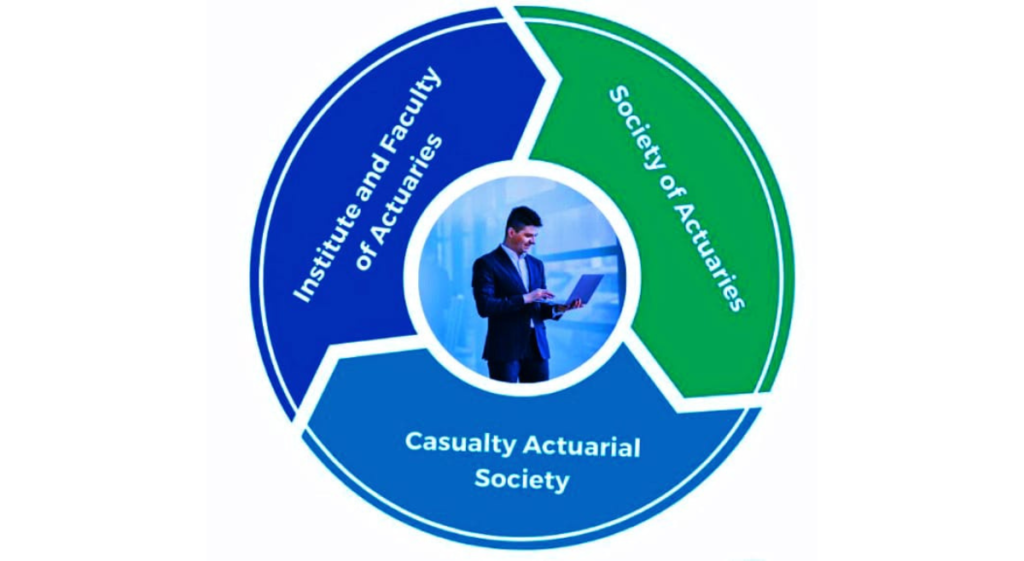If you love what you do, you will never have to work a day in your life. It may be a risky decision to compare Marc Anthony’s career to that of an actuary, but a highly satisfying profession with a positive work-life balance sounds even less credible. If you enjoy working with numbers (or letters at the upper levels of academic mathematics), let me show you how to become an actuary and feel as “unemployed” as Marc.
Choosing the Right Subjects to Become an Actuary
It is no secret that this profession necessitates exceptional intellectual ability. The only required course need is A Level Mathematics; however, supplementary topics such as Economics or Physics may be beneficial for professional tests.
The main thing is to choose things that you enjoy and are likely to excel in. Actuarial science has some of the greatest university entry ratings, so if you are guaranteed top marks in a seemingly unrelated field, this could be a good alternative.
The best applicants will have great grades but also be well-rounded persons, so possessing a varied variety of abilities will help you stand out from the competition. Practical subjects, such as art, demonstrate creative talent, while modern languages might lead to specialty chances with worldwide companies.
Learn More : https://theacademicjunction.co.in/what-is-an-actuarial-science/
Essential Soft Skills to Excel in Actuarial Work
This takes me to the significance of soft skills in the perspective of employers, particularly emotional intelligence. The capacity to control your emotional responses and be aware of how they influence those around you is essential for effective communication and obtaining desired results. You could spend days analyzing numbers and pulling together an in-depth analysis, but if you can’t condense and portray it in an understandable way for board members, they won’t be convinced. Always remember that consumers buy from people, therefore get comfortable selling.
If you’ve read this far, I’ll presume you always did your math homework first because it was your favorite subject, and that you’re wired to learn it quickly. This is the usual expectation of an actuary: someone with advanced mathematical and technical skills. They primarily employ their analytical and problem-solving skills to find patterns and assess risk, therefore statistics, probability, and calculus are particularly important.
Because actuaries work in financial and corporate environments, they must have a strong understanding of the industry. This is essential for applying actuarial judgement, which is a critical area where actuaries contribute value that a machine cannot do.
Explore Now : https://theacademicjunction.co.in/
Understanding Timeframes and Routes to Become an Actuary
The time it takes to become an actuary is determined by the route used. For those starting with no exemptions, the average time will be six to eight years. Individuals who have completed an IFoA-accredited actuarial science degree can graduate with up to six exemptions, significantly decreasing the time to qualification.
Other courses with a high level of mathematical content may exempt graduates from at least one exam, depending on the syllabus. This means that students who discover a career after deciding on a university degree are not completely out of luck.
There are also postgraduate degrees in actuarial science that provide you with the same exemptions as an undergraduate course. Because of the great need for actuaries, some corporations generously support these postgraduate courses. Becoming an actuary takes time, regardless of the path taken; nonetheless, if you do not scale the mountain, you will not be able to see the view.
Exploring Actuarial Organizations and Exam Boards
There are a number of different actuarial organisations through which you can complete exams.
3 Actuarial Organizations

Institute and Faculty of Actuaries
The IFoA is based in the UK and is connected with IFoA accredited universities.
The Casualty Actuarial Society
The Casualty Actuarial Society (CAS) is an American organization that governs actuaries who specialize in property and casualty insurance.
The Society of Actuaries (SOA)
The SOA is another American organization that governs actuaries working in life, health, pensions, and retirement.
Even without a degree, you can become an actuary! If university does not appeal to you, you can alternatively enroll in an Actuarial Technician Apprenticeship (Level 4). This involves working in a team to help experienced actuaries and will serve as the foundation for a career in finance as an Actuarial Analyst.
Following that, you may choose to consider a Higher-Level Apprenticeship (Level 7). This will provide you with official training in addition to your exam preparation, allowing you to meet PPD criteria. Apprenticeships are available to both graduates and non-graduates, with the duration altering according on your eligibility for exemptions.
Without IFoA test exemptions, they normally last three and a half years, but this decreases by six months for every two topics you are exempt from.
Another alternative is to become a Certified Actuarial Analyst. This is a far more flexible option, as you can work at your own speed and take exams at exam centers all around the world. You can complete the certification while working full-time or unemployed, and it typically takes two to three years.
All that is required is to register for tests, pass the modules, demonstrate one year of relevant work experience, and pass the Online Professional Awareness Test. This entitles the CAA designation at the end of your name, as well as the possibility to join the IFoA, SOA or ASSA.
Already working in a related industry? Direct application may also allow you to transition from an associated profession such as risk management, financial services, or business analysis, if your skills and experience align.
The Role of Placements and Internships in Actuarial Training
For those enrolled in an actuarial degree, there may be the option (or compulsion) to carry out a year in industry. The university placement office is usually heavily involved in connecting students to companies with whom they have built strong relationships, and prepare them thoroughly for the application process. If successful, students can impress these employers through their diligence and production of high quality of work, increasing their chances of a graduate role offer.
If a job offer is not on the cards however, universities often organise careers fairs, company talks and send students endless communications about upcoming graduate roles. Having this valuable industry experience under your belt is a great advantage when applying for work. For those not enrolled in an actuarial specific programme, it is important to show enthusiasm for the profession and a strong desire to learn more about it.
Many actuarial firms hire graduates with backgrounds in math, finance, economics, physics, and engineering, therefore students who excel in these fields are more likely to get hired. Regardless of degree, becoming a student member of the IFoA requires a 2:1 or higher. To get an understanding of the mathematical level required to become an actuary, take one of the IFoA’s non-member entrance tests.
Navigating Actuary Exams: A Roadmap for Aspirants
Now for the fun part. Before you can begin exams, you must become a student member of the IFoA, which will get you access to a variety of tools. IFoA exams are taken twice a year: in April and September. The number of exams taken in one sitting is at the discretion of the person, though more than two would be difficult to balance with a full-time actuarial job.
Studying for such difficult examinations while also negotiating a new analyst career may appear daunting, but most employers offer a good study package. This normally includes all necessary resources, tutorial classes, mentors, and study partners. It is also usual for the employer to support exams and offer a predetermined pay increase for each exam pass – a wonderful motivator to keep focused!
For those who graduate with an approved degree, the accumulated exam pay increases are divided evenly alongside the first few exam passes at the company.
To qualify as an actuary under the IFoA, 13 tests must be passed. The first level consists of seven actuarial and business exams: CS1, CS2, CM1, CM2, CB1, CB2, and CB3 (for which you must previously pass the Professional Skills level 1 course). These will serve as the foundation for your career advancement, providing you with the necessary skills and strategies.
The following step includes three core practice examinations (CP1, CP2, and CP3) that enhance overall understanding. You will be categorized as an associate once you have completed these requirements, as well as two years of PPD and Professional Skills Stages 1 and 2.

At this level, you can call yourself an actuary and use the letters AIA or AFA at the end of your name. Beyond this stage, you can determine your professional path by selecting two specialist principle subjects and one additional specialist advanced subject, which is the final exam required to achieve fellowship. This must be combined with three years of PPD, and your surname can then be followed by FIA.
Also Explore : https://theacademicjunction.co.in/indias-need-25000-actuaries/
Managing Exam Stress and Study Techniques for Actuary Exams
Becoming an actuary is not simple, but nothing worthwhile is. It needs discipline, effort, and a genuine interest for the job, but it may also be completed at your own time. When it comes to studying for tests, some people choose to focus on one at a time or take breaks in between to maintain a healthy work-life balance.
Others forego their social lives in the near term in order to complete their tests as swiftly as feasible. Either way, however, does not obscure the fact that actuarial tests are notoriously difficult and take more than just time to complete. Pass rates are also disconcertingly low, therefore the chances of passing every exam first time are slim. However, as Albert Einstein once stated, “You never fail until you stop trying.”
Everyone learns differently, so what works for me might not work for you, and vice versa. As a result, it is critical to understand the four distinct learning styles: visual, aural, kinesthetic, and reading/writing. Depending on the teacher’s manner, a tutorial class may be quite beneficial to an aural learner, but it will be of little benefit to someone who processes knowledge by writing it down.
Personally, I can draw connections much faster by visualizing mental maps that I’ve made on my own or recalling a comparable question that I’ve rehearsed before. This is far more advantageous to my recall than the difficulty I have in staying focused during a long lecture. To make the process go as smoothly as possible, it may be more productive to first determine what works best for you.

It is also vital to handle exam stress by obtaining enough sleep, exercise, and a healthy diet. All three of these critical variables can have a significant impact on the brain and its function, thus attempting to manage external factors such as the amount of time spent studying can make the process much easier. Revising in little portions rather than over extended periods of time can also be far more fruitful.
The pomodoro technique is a well-known approach for breaking up your workday into 25-minute attention sessions to instill a sense of urgency and decrease procrastination. This is an excellent example of short-term suffering and long-term reward!
“We must all suffer from one of two pains: the pain of discipline or the pain of regret. The difference is discipline weighs ounces while regret weighs tons.”
– Jim Rohn
Actuarial Salary Expectations and Career Opportunities
Now, for the elephant in the room. Through numerous discussions using the inquiry “What do you do?” I’ve noticed that folks who have heard of an actuary are aware of two key facts. The first is that they are mathematical geniuses; the second is that they make a lot of money. Earning potential is frequently a taboo subject and is rarely mentioned in detail by professionals; yet, a fast scan at a few recruiters’ LinkedIn profiles will quickly alert you to the presence of many thousands.
Salary, of course, varies by area. Actuaries in London earn the highest pay in the UK, but London also has the highest cost of living, so it is vital to realize that salary is all relative. It also depends on the industry, with the most recent poll revealing that Reinsurance had the highest maximum salary of £415,000. The current UK average base salary is £70,795, with an average supplementary cash compensation of £8,433.
The typical base wage for an analyst is roughly £39,694, but this amount swiftly rises in the early years as pay increases are provided for each exam pass. Once qualified, experience will continue to raise total salary, with the greatest increase occurring every 3-4 years. When you combine this with annual bonus entitlements and other company perks packages, you can be confident that you will be satisfied with your compensation.
UK General Insurance Actuary Salaries by Qualification Year

Emerging Fields and Expanding Roles in Actuarial Work
The demand for actuaries is anticipated to rise by 21% between 2021 and 2031 alone, so job security will be the least of your concerns as machine learning and AI’s capabilities grow. However, there is a genuine risk that many other professions will be displaced in the near future. As previously said, soft skills cannot be recreated by a computer, nor can professional actuarial judgment, which is the result of confidence and expertise.
It is critical to see technological advancements in a positive light, and how they might increase the efficiency of actuarial work by replacing tedious, everyday chores. One example is the use of neural networks to extract complex information from data without the need for human interaction. This enables actuaries to concentrate on interpreting these models rather than performing manual manipulation.
Actuaries are no longer limited to pensions, general, or health and life insurance. The formerly limited position is currently growing into new areas such as finance, risk, sustainability, and data science. Companies are recognising the importance of data insights in effectively assessing risk and using this knowledge to differentiate themselves from competitors. Who else is better suited to analyze these facts and solve complicated problems than an actuary?
Even Elon Musk stated that he seeks “revolutionary actuaries” and has “great respect for the actuarial profession.” If the world’s second richest man can put his trust in them, so can anyone else.

These new areas do not reduce demand in traditional fields. The insurance industry is predicted to increase at a global CAGR of 3.5% until 2030, led mostly by the general insurance sector as new risks emerge and existing hazards persist. Cyber hazards, in particular, have been a source of concern, with the market expected to increase at a 25.7% CAGR from 2022 to 2029. As for pensions, life, and health insurance, people will not work forever or become immortal, therefore this sector will not slow down either.
Become an Actuary: Is a Career in Actuarial Science Right for You?
Aside from the foregoing, the most crucial question you should ask yourself before embarking on the actuarial journey is whether it is right for you. If you choose the career because it came up first when you searched for “best actuarial science coaching in india,” it is unlikely to be.
Considering a career in actuarial science? If you excel in analytics, possess strong mathematical skills, and have a keen interest in risk management, becoming an actuary might be the right path for you. Actuaries play a crucial role in industries like insurance, finance, and healthcare, assessing and managing financial risks.
To succeed in this field, it’s crucial to invest in a solid education and gain the necessary certifications. Academic Junction stands out as a reliable partner in providing quality educational resources and guidance for aspiring actuaries. With their support, you can enhance your knowledge and skills, increasing your chances of success in the dynamic world of actuarial science. Explore the offerings at Academic Junction to pave the way for a rewarding career in this in-demand field.
Visit Now : https://theacademicjunction.co.in/


